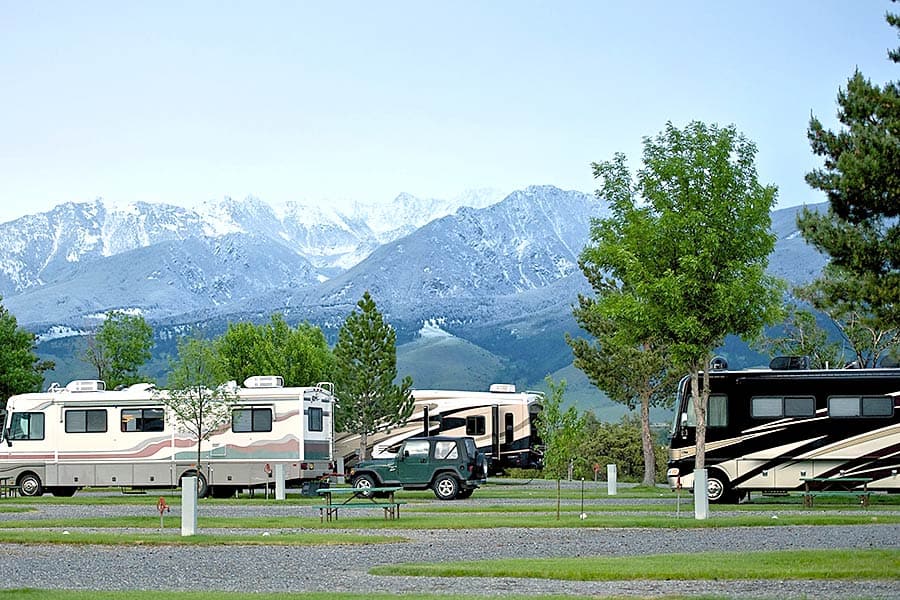
Whether you’re committing to a full life on the road or you simply want to enjoy road trips, knowing where you can and cannot stay is a huge part of the planning process. Scenery, safety, hookups, and several other variables are probably on your mind. RV parks combine all of those with a convenient location that’s usually near cities or landmarks.
So, do RV parks allow vans? Some do, and some don’t. While many parks don’t care as long as you’re a paying customer, some require that your vehicle meets RV standards. For this reason alone, it’s always a good idea to call the park before you book your campsite.
In this post, you’re going to learn everything you need to know about where you can park your van overnight, including:
- How to know which RV parks allow vans
- How to improve your chances
- Learn about camping eligibility at caravan sites
- How to make your van RV park-friendly
Do Caravan Sites Allow Vans?
Yes and no. Caravan sites are unlike traditional campgrounds in many different ways. There are no tents allowed. It’s quite a unique type of camping because everyone around your site will be in a larger vehicle.
There are certainly pros and cons to camping at an RV park, and knowing whether or not a person can stay the night is a common issue.
Many RV parks don’t allow any vehicle or tent other than an RV. It has to meet RV codes, coming equipped with electrical outlets, water, sewage, and so on.
Since most vans aren’t built with those necessities in mind, they’d be excluded from those types of RV parks. Even if you convert a van, you might be met with a negative answer, nonetheless.
It should be noted that Class B RVs are considered vans to some people. As long as they come from the manufacturer as an RV, you shouldn’t have a problem being accepted by RV parks.
The main issue is when someone tries to convert their van to a Class B. It’s not licensed or crafted as one, making it hard to get accepted into the parks.
On the other hand, many caravan sites are completely fine with allowing vans. It’s truly on a park to park basis, which can be somewhat unpredictable.
Your best bet is to call the RV park ahead of time to ask if your van is allowed. It’s also essential to notify them that it’s an actual van, not a Class B RV. Some owners call their Class B’s a van, which can make the situation confusing.
There are also the campgrounds that are considered RV parks and traditional campsites. They might be split down the middle with access for all vehicles separated to different sides of the lot. Some of them even have hookups at every site without any vehicle requirements.
While they’re not necessarily considered RV parks, it’s always worth staying at these types of campgrounds since you don’t have to fret about getting turned away.
Other Posts of Interest
- 19 Tips For Choosing The Best Binoculars For Van Camping
- Can You Use a Tarp as a Tent Footprint?
- 11 Camping Destinations In The Allegheny National Forest
How To Improve Your Chances Of Being Accepted At An RV Park
If you’re set on getting an acceptance into an RV park, you should do everything that you can to follow their rules.
For starters, many RV parks don’t allow vehicles that are older than 20 years (yes, even RVs of that age). If your van exceeds the age limit, there’s no way around it. This rule is usually set because they don’t want any mechanical issues, oil spills, or breakdowns happening at their park. Old vehicles also don’t look as ‘nice’ to some parks.
Another factor that’ll undoubtedly play a role at most RV parks is the appearance of your van. As mentioned in the previous paragraph, old vehicles don’t always look that great if they’re not well-maintained.
That being said, the appearance of your vehicle will be taken into consideration at some RV parks. If you’re driving a van that’s rusted out and has duct tape covering the holes, they probably won’t let you in. Some RV parks request a photo of the vehicle before you staying there.
The appearance of a van also matters if it’s not large enough.
Some places don’t want cars, trucks, or small vans showing up to their park. If you have a large van that you can stand up in, then you might be good to go. But on the other hand, compact vans might get denied. It all depends on the RV park in question.
Finally, you should consider the date that you’re staying at the RV park.
During the summer, when everyone’s packing RV parks and campgrounds, you’ll be less likely to get a ‘yes’ for your van. However, when the parks aren’t as packed, and they need more campers during the winter, you’ll have a higher chance of getting a spot.
In fact, some RV parks even list that they only accept vans during the fall, winter, or spring seasons.
You could go as far as converting your van to an RV as much as possible. While it still won’t be considered an RV legally, RV parks tend to accept them more often.
Building out a sewer and water system as well as electrical inlets could be a huge step in your favor. They’re not too tough to do, but these alterations might dramatically expand your camping horizons. Read our post “What Is An Inverter? Why Would I Want One In My DIY Van Build?” here.
Converting A Van For RV Parks
Converting a van isn’t too tricky if you only want to add a few RV features to it.
For example, you can put a solar panel on top of the roof for power, run a sink with two hoses and two 5-gallon water tanks, and try adding a bed to it. All of these additions can cost upwards of $2,000, but it’s well worth the investment to be able to use RV parks.
There are a few parks that frown upon vans because they don’t have a toilet. If you’re staying at an RV park without bathrooms and you don’t have one in your van, you could be in for an interesting weekend.
While adding all of these features might not grant you acceptance into an RV park, you’ll find that it makes your road trips much more comfortable. Both the driving and the camping aspects of your trip will be made more comfortable with these additions.
Honestly, all you can do to get into an RV park, or any campground for that matter, is ask. The worse that can happen is that they will tell you ‘no.’ Whether they’re asking for the age, pictures, RV qualities, or nothing at all, these parks are always unique in their decision.
The way to be completely sure is to contact the park and ask if your vehicle will be allowed entry. It would be best if you were honest about the state of your van – the last thing you need is to arrive at a park and get turned away because you were not completely truthful about the state of your van.
For the most part, RV parks will allow vans to stay there for a few nights if they’re well-maintained and in good shape. They want to be paid, and you want a place to camp, so it’s a good trade!
RV parks are almost always near popular attractions, which is why so many people choose them over regular campgrounds. They’re also usually a bit more costly to stay at but are clean and safe.
The good news is that you can find an RV park that’ll allow vans pretty much anywhere if you look hard enough. Find out where you want to visit, call the surrounding RV parks, and choose which one is the best for you.
To learn more about picking a site to park your van for the night, read our post “How Do You Choose The Right Campground For Van Camping?” here.






